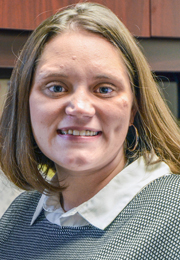Suicide watch: SRU provides outlets for prevention and outreach

Jan. 28, 2016
SLIPPERY ROCK, Pa. - As it has since the 1950s, suicide remains the second leading cause of death among college students with more than 1,000 reported cases each year.
And with growing enrollments across the country - nearly three million more students will be on college and university campuses by 2022 according to the U.S. Education Department - higher numbers of young people could be dying from what, in many instances experts say, are treatable problems.
Depression, hopelessness, anxiety and loss (relational, socially, financially or work-related), are some of the leading causes that can trigger suicidal ideation and contribute to the fact that one in 10 college students has made a plan to take their life.
That's a statistic Slippery Rock University takes very seriously. The University has created a series of initiatives to make sure help is available 24/7 and that all students know, 'they are never alone.'"
"I've seen students that have fallen into all of those causational categories," said Karla Fonner, assistant director and senior case manager, student retention services. "Ultimately the goal is figure out what's standing in the way of the student being mentally healthy and then getting them past those barriers.
"With the resources that our University either provides or partners on, we can get (students) through whatever they are facing and let them know that eventually everything can be okay."
One of those resources, and often times a student's initial point of contact in a suicidal ideation situation, is Student Health Services.
"(The Student Health Center) is truly a safe haven for our students," said Janet Flecker, certified registered nurse practitioner at SHC. "A lot of times, when students are having these types of issues, they are first and foremost looking for someone to listen and to help them open up.
"We're a great reference point along the chain, and we'll get them where they need to be and help ease them into the process. Everyone in this unit is caring and compassionate. When students don't know where to turn, they can turn to us and we'll direct them, day or night."
That direction can take one of two routes according to Fonner.
If a student is determined to be in a state of emergency, they can be seen by either a counselor from the University's Student Counseling Center which provides 24/7 "on call" personnel to deal with emergency situations; or, a specialist from the Butler County Center for Community Resources will be contacted to either speak to or visit with the student in order to make a determination for further assistance.
If the situation is less pressing, students begin by speaking with Fonner.
"I can help them get to the root cause and to determine what might be the most beneficial to them in terms of next steps, whether that is a referral to the counseling center or one of our off-campus options depending on what it is that's affecting them," said Fonner.
What about those students that sit in silence, not asking for help? Fonner said that's where the University community can step in.
SRU offers an online CARE form that students, faculty, staff or off-campus family members can utilize to alert the University's Behavioral Intervention Team of possible situations. The form, available via the University's website at https://sru-advocate.symplicity.com/care_report/index.php/pid557961?, can be accessed through mySRU which is located in the header of each page on the website, or by visiting the Student Intervention or Behavioral Intervention Team pages.
The report, which is funneled through Fonner's office, provides the impetuous for action.
"I'll see information from a faculty or staff member, a family member, another student or roommate, who is concerned about a student who may appear or is feeling depressed, has talked about suicide, or even written about suicide in a class journal," said Fonner.
"Maybe the person hasn't even mentioned suicide out loud, but are giving those around them the sense that the person is in a very dismal or dark place. Once I have that information, I reach out and ask the student to come in for a meeting and talk about what's going on with them."
While students in these types of situations may not be looking forward to going to a meeting of this sort, or even open to the idea initially, Fonner works to help them overcome their resistance and shares a list of campus and county-based resources they can access.

FONNER
"If (a student) chooses to meet with me," Fonner continued, "I can assess if they are low or high risk and react accordingly.
"This time in a student's life is very complicated. As people, they are at that point where so many things are changing...it's their first time away from home for any period, the first time living on their own, dealing with real people in the real world and faced with becoming a grown up.
"Most are able to adapt without issue," Fonner continued, "but for others the adjustment isn't always easy, and when it's not, they can begin to become overwhelmed and spiral downward. Very often they know something is wrong and they need help, but they don't know what they need, how to fix it or where to turn. Transition can be overwhelming."
Fonner added that while her office is always there to assist, it is not meant for emergency response. "If it's 10 p.m. on a Tuesday night and there is an immediate need, submitting an online form is not the best option," said Fonner. "In those situations, students should visit the health center or call campus police."
If hospitalization is required, the University works closely with both Butler Hospital and the Clarion Psychiatric Center.
In those situations, Fonner's office will reach out to faculty to let them know that the student will be absent from class and that working with them upon their return would be appreciated.
"We don't divulge where the student is, or why they are not in class," Fonner said. "It's merely a heads up so professors don't think students are skipping out. We want to help the student as much as possible while they are off campus, so that they can reintegrate smoothly upon their return."
Fonner can only contact parents or guardians if the student requests her to do so or the situation is determined to be a matter of life and death. Students are also provided information about how they can talk to roommates, faculty or coworkers about the situation.
"We have a number of social work type of things in place once a student returns to campus," Fonner said. "We want to know how they are doing, if they've returned to classes, are they attending club meetings and taking any medications, and so on. We are here every step of the way."
Another on-campus resource for students is the SRU chapter of Active Minds.
A nationally recognized, nonprofit, student run organization, Active Minds is dedicated to raising awareness of mental health issues and reducing stigma associate with mental illness. It is open to all students interested in promoting open discussions of mental health and creating a better life for those who experience mental illness.
Allison Malmon, a student at the University of Pennsylvania whose older brother completed suicide, founded Active Minds in 2001.
"Students need to know that it's okay to seek help," said Melissa Nard, assistant professor and licensed psychologist at the Student Counseling Center. "This is a student group that reaches out across all majors and all lines. Peer to peer contact often times has the most impact.
"No one on this campus needs to struggle. Help is available."
MEDIA CONTACT: Robb King | 724.738.2199 | robert.king@sru.edu

